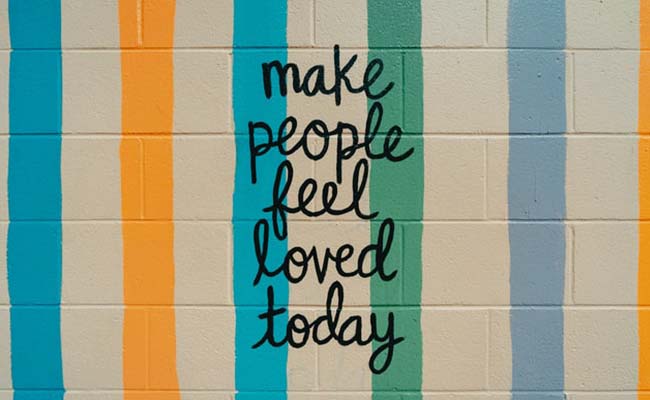Self-concept is a term commonly used in psychology.
One's self-concept is a collection of beliefs about oneself. These beliefs are constructed from experiences and the influences of environment and others.
In this post I'll walk through some real-life self-concept examples, so that you can understand how it applies to your life.

The idea of self-concept is very much linked to the theory of positive thinking and manifestation, and the theory of cause-and-effect and the law of attraction.
There is a direct relationship between the current state of your life and your self-concept, because the premise is that you will only ever do as well as you believe yourself to be capable of doing.
I will say that while positive thinking alone won't create the outcomes that you want, it is very powerful when coupled with good organization and a commitment to action.
Moreover, positive thing is inherently more powerful than negative thinking because negative thinking will only ever bring further negativity into your life. It is unhelpful.
This is at the crux of self-concept: It is our self-limiting beliefs that determine our progress and potential in life. Our self-limiting beliefs hold power over us and prevent us from going further.
Your self-concept is formed by information you have accepted as truth.
For example, you may have taken part in a race when you were 10 years old and finished at the back of the field. Because of this, you may have developed a belief that you are a bad runner and incapable of winning a race.
At that point in your life your self-concept may have made you shy away from sport and competitive activities.
You may not realize it but this may have had a negative knock-on effect throughout your life.
It may be the case that you began to avoid sport and exercise and as such your health has suffered. It may be the reason that you gained weight as a teen, which you now struggle to lose in adulthood.
It may be the case that this early negative experience in a competitive environment has prevented you from competing to your potential in other areas of your life such as the workplace.
It may have made you submissive and lacking in confidence. This may have led to you being downtrodden in relationships.
And so it's easy to see how small, seemingly insignificant events can manifest themselves, and self-limiting beliefs can develop and take on a life of their own that continues through adulthood.
The “Other People” Self-Concept
Let's take another example. It may be the case that you come from very humble beginnings. Perhaps your parents were uneducated and struggled financially.
You may have grown up with the impression that wealth is for other people and not something that you and your family have access to.
You may have developed this idea from your mother or father making references to society not caring about the poor, or telling you that certain things are reserved for richer people such as fancy cars, big houses, private schooling and holidays abroad.
So while you might have had aspirations of achieving something far greater than your parents were able to, you have been unable to get past these self-limiting beliefs instilled in your psyche by your parents. This misinformation made you believe that you don't have the inherent ability.
This is a great example, because one of the most common self-concepts I come across is the “other people” concept.
Many of us grow up with dreams in our head that we never even attempt to try and achieve. We never get started with them because there is a firm barrier between taking the action and the self-limiting belief that this pathway is for “other people”, not people like me.
We aren't conscious of this concept when you are young, or even in our teens and 20's. It is only into our 30's and 40's and possibly 50's that we start to realize that actually we do have the potential and could have done what we wanted to a decent level of proficiency, at the very least.
And this is why we see so many people change carer paths or make very drastic changes to the course of their lives in later years.
It is very easy for seemingly minor events in early life to limit our outlook on our abilities and potential.
The important thing is not to let a negative self-concept control your life.
You must recognize that you can only ever be as effective as you believe yourself to be.
Whether in your job, in relationships, in sport, in reading, writing, debate, or any area of life, if you believe yourself to be inferior then you will remain so.
Each of us has been programmed to walk, talk, think, and act the way we do today. You cannot think, feel or behave any differently on the outside unless you change your master program, your self-concept, on the inside. A negative or erroneous idea in your self-concept will be expressed in negative attitudes and behavior in your life and relationships.
How Labels Form Self-Concept & Stifle Our Potential
Consider the above quotation… This is why people labelled clumsy end up considering themselves clumsy and continue to be clumsy their entire lives.
There is no logical reason for someone to be naturally clumsy, unless they have a disability which means they are prone to being clumsy. But someone who has been labelled clumsy and believes themselves to be so remains in that self-concept, indefinitely.
The same applies to a person told they are stupid, weak, ugly, the list goes on.
When we develop such self-limiting beliefs, either through a bad experience or the influence of others, it prevents us from progressing in life and trying new things.
For example, we all know someone who rarely participates in games because they have a self-concept that they are not very good. Such a belief usually arises from being labelled as such.
It may be something simple and fun like being asked to have a go throwing hoops over some pretend ducks at a fair. The answer is; “No, I've never been very good at things like that”.
The self-concept is such that it even prevents them from having fun. They feel shy, embarrassed, insecure, incapable.
While this example seems fairly minor, it really isn't. This self-limiting behavior seeps into other areas of our lives and limits our potential.
Once you start telling yourself that you're not good enough, that you're incapable, that you are inherently inferior to other people; then your self-image, self esteem and self-confidence are disadvantaged.
Of course, we all have limits. Our natural talents and abilities and many parts of our personality are fixed at birth.
But we are able to develop skills and abilities and become better at those things we aren't predisposed to be good at, and even better at those things we are naturally good at.
Self-Concept & Wealth
You have a self-concept about every area of your life, be it your relationship, your work, your health, and yes, even money. So let's look at another self-concept example.
Many of us have self-limiting beliefs about our power to earn money. This is certainly something that I have struggled with in the past.
Earning a lot of money, or even just an amount of money to be comfortable and own a property and a car and have a couple of holidays a year seemed like something that only other people were able to obtain; people who are academic and have careers as doctors, accountants, lawyers, bankers, etc., or superrich sports players and famous actors and actresses.
It's that concept of “other people” again.
What happens when you have a self-limiting self-concept around money is that when you begin to earn more money, or come into money through some medium you will tend to squander that money or be on unaccepting of the fact that you deserve that money.
In one way or another you will end up back at the same level of used finance you have been used to. Similarly, if you start to earn less money than you usually do, you probably won't stay there for long and you will return to the level that you feel is acceptable for your life – albeit that it is self-limiting.
This is why many people earn the same amount of money, or a very similar amount, for many years. Because they are stuck at a level which they believe is the amount of money they are supposed to earn, that is deserving of someone with their status.
They believe that people like them earn (approximately) this amount of money and they do not expect more or think that they deserve more. And even if they think they deserve more, they do not feel that they have the necessary potential to earn more.
Why is it that so many people who win the lottery are broke within just a few years? We hear so many stories of this.
We are talking about people who had wished they had more money for so long, spending every day of their waking lives working their fingers to the bone.
Yet when given the opportunity to be wealthy they squander the money or give it away.
Sure, you can blame it on bad money management, but the reality is those people have a self-concept that dictates to them that they don't deserve the money, that they are incapable of handling the wealth, that people like them don't deserve to have the money, that they aren't capable of making good use of the money.
Deep rooted in the sub-conscious mind is a belief that wealth is for other people, so they repel the money.
Conversely, we all know of people who are very good with money. Even with a small amount of money they can start a business and grow it within a couple of years and make a ton more money.
We all know people who seem to be very good investing. They use their intuition to seek out stocks and investment opportunities that end up being very prosperous.
I have a very close friend who went broke overnight, and within a year was back on his feet again and earning the same amount of money before he went broke. Fast forward two years and he is now richer than ever.
When I analyze this friend it is obvious to me that the reason he never gave up during that year of hardship was because he had an unbreakable self belief that he was not destined to be broke or poor, or to have his life determined by one period of bad luck. He believed he could not only get back to where he was, but do even better this time around. This is about mindset.
You cannot behave in a way that is different from your subconscious programming any more than a computer could decide to disregard its programming
How to Change Your Self-Concept
The one thing we do have control over its attitude. We can be positive about our potential. It is up to us if we limit ourselves through mental gymnastics. This is a fact.
Take an overweight person who is extremely unfit and hasn't done any real exercise in 20 years.
This person will most likely believe that they are incapable of running a 5K race and competing with other people their age.
In fact, it's probably something that they would do their utmost to avoid, and never have to do.
It isn't just their weight that is stopping them, or the fact that they haven't run for 20 years, but also their self-image, their self-confidence, their insecurities.
Their self-concept would not allow them to believe that they are capable of doing this, and that they deserve to do it and can reap the benefits of doing it.
The thing is, we all know that given six weeks training, that person could run that 5K race without stopping. And given a further six weeks training, that person could begin to compete with people that they never thought they would be able to run alongside.
And so as progress gathers momentum, the self-concept begins to evolve and the self-limiting beliefs begin to evaporate.
This is why it is so important that we encourage people to step outside of their comfort zone and into the present moment of possibility.
Self-Therapy
When we analyze self-concept it is easy to see how positive thinking, visualization and proactive living can change the fortune and the outcomes of our lives.
I have a post about bad luck that I received a lot of criticism for from people who say they are in a perpetual state of bad luck. They say that no matter what they do with their lives they seem to attract bad people, bad finances, bad health, and just a general lack of prosperity and opportunity.
Of course I agree that there are those exceptions in life where people just experience an enormous amount of bad luck and it is seemingly unavoidable.
But for the large majority of people, if they analyzed their self-concept and the contents of their subconscious mind – the impressions, the beliefs, the imagery – they would see that their self-concept is self limiting and negative and in part manifesting itself in a physical reality.
I'm not saying it is anywhere as near as simple as think positive get positive, think rich get rich, etc. But what I am saying is that all of us have, to some degree, self-limiting beliefs that are holding us back.
And thinking and saying “things are going to get better”, or “I'm going to do X or Y”, for one day isn't enough. We have to begin to self-liberate and paint a picture of the life we want and really believe in it. We have to commit to taking action, on a daily basis.
But more than that, we have to literally re-engineer the subconscious mind. All those habits and beliefs that we developed at a young age that have continued to control the way we behave need to be remapped.
The first step in doing this is identifying what is holding us back.
For example, I have a tendency when things are going badly for me to think that this is it! There is a belief that comes over me that everything from here on out is going to follow the same trajectory.
Even though I am only standing in a puddle, I believe for some reason that I am ultimately going to drown – so to speak.
I think a lot of people experience this, particularly after a run of bad luck. But I know where this comes from.
This comes from a period in my childhood where my life literally did crumble around me and I didn't have any control over it. It left me sensitive to change and things I couldn't control.
I took fewer risks and committed less to goals, presumably because I couldn't face the possibility of losing what I achieved, or worse failing. I was vulnerable, but I didn't know it at the time. Anxiety then manifested itself in my life in a number of ways.
So when things in my adult life take a turn for the worse, the subconscious belief that everything else is going to follow and crumble around me immediately starts to manifest itself and control my actions and my thoughts and my responses.
This has a negative effect on those around me in terms of the way I interact with them – so it affects my relationships. I will start to feel down and perhaps not feel like participating in my hobbies or fitness regime. I will start to feel anxious and not sleep as well, so my health is affected too.
Again, you can see how the self-concept can take on a life of its own. It can snowball through our lives affecting every area of life.
From one negative belief a landslide of negativity can ensue.
So it is of paramount importance that we identify these tendencies.
We need to be honest with ourselves and recognize where we are self-limiting and why. Self-therapize, as I say.
By becoming fully aware of how our minds work, we are able to begin the inner-engineering required to remap the subconscious and change our habits and behaviors, and ultimately our self-concept.
You have a self-concept for how much you weigh, for how much you eat, how much you exercise or how fit you off. You have a self-concept for how you dress and how you appear to other people.
You have a concept of yourself as a parent, and as a child to your parents.
You have a self-concept of how popular you are, at work and among friends.
You have a self-concept for how well organized and efficient you are, in both your personal and work life.
You will always behave in a manner consistent with your self-concept.
The quotes in this post were taken from a book called Maximum Achievement by Brian Tracy. I recommend the book, but preferably the audio book because it's great advice you'll want to have access to on the go.
=> Click here to see the audio book





Lyric MacCarmaig says
I want to gush and gush like a fangirl over this post. Your blog actually put me back on track when I got in a really bad headspace recently and I hadn’t even read the post yet just the title.
Between this post and As a Man Thinketh by James Allen I found a mindset and guide for thinking and taking control and responsibility for my life that has made me happy and content even though my circumstances aren’t good, even!
I’m stuttering on the keyboard, I swear I actually can write. This post is exceptional in content and voice and I am really excited to read more of your work.
Could I share your post on my blog? I think I already shared a link but could I reblog this post? I’d link and credit your page of course. I know a couple of my readers would love it!
Alfred James says
Sure, go for it 🙂
purity says
Highly beneficial to me, never knew a thing called self concept pattern until i met this article.
Minky says
I see myself so much in your posts! They are very useful in reminding me about my negative thought patterns. Thankyou
Alfred James says
Thanks Minky. It’s interesting isn’t it…we are what we think!
Maureen says
I have been trapped in a mentally/ emotionally abusive relationship for many years. I know this has destroyed my positive self- concept and rendered me powerless to change.. without changing my self concept back to who I know I am. I feel like I gave up along the way and see no way out… so many attempts and failures. I loved your article but feel I’m in a catch 22. I can’t change my self concept while in an abusive relationship .. I can’t get out until I change my self concept. Any suggestions??
Emir says
Hy dear Alfred, I’m Iranian,I read this with translation and I love that! Thank you🙏🏻
Alfred James says
Hi Emir, that’s wonderful to hear. Have a great day!
Darcelle Mattson says
Maureen. I’m not Alfred obviously. However, I have experience with abusive relationships and I can tell you that there is no way you will ever change your self concept until you are completely out of the relationship (complete no contact, forever bye, bye). You must then take the time you need to evaluate and re-engineer who you want to be as a person who loves herself enough to only associate with people who truly love themselves and you. If you do not do this, you will live in the abyss between happiness and misery; Hell on earth.